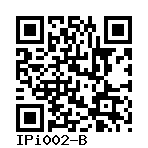iPSC-MARCH-AFC-002
IPi002-B
General
Cell Line |
|
| hPSCreg name | IPi002-B |
| Cite as: | IPi002-B (RRID:CVCL_D6P9) |
| Alternative name(s) |
iPSC-MARCH-AFC-002
|
| Cell line type | Human induced pluripotent stem cell (hiPSC) |
| Similar lines |
IPi002-A (iPSC-MARCH-AFC-001) Donor diseases: Multinucleated neurons-anhydramnios-renal dysplasia-cerebellar hypoplasia-hydranencephaly syndrome IPi002-C (iPSC-MARCH-AFC-003) Donor diseases: Multinucleated neurons-anhydramnios-renal dysplasia-cerebellar hypoplasia-hydranencephaly syndrome |
| Last update | 1st March 2024 |
| Notes | hiPSC line derived for MARCH amniotic fluid cells Original source of amniotic fluid cells : 10.1136/jmedgenet-2016-104296 Pathological mutation in CEP55 : c.1274C>A, p.Ser425Stop |
| User feedback | |
Provider |
|
| Generator | Institut Pasteur (IP) |
External Databases |
|
| BioSamples | SAMEA115370022 |
| Cellosaurus | CVCL_D6P9 |
General Information |
|
| Publications | |
| * Is the cell line readily obtainable for third parties? |
No |
Donor Information
General Donor Information |
|
| Sex | male |
Phenotype and Disease related information (Donor) |
|
| Diseases | A disease was diagnosed.
|
Donor Relations |
|
| Other cell lines of this donor | |
External Databases (Donor) |
|
| BioSamples | SAMEA115370016 |
Ethics
| Has informed consent been obtained from the donor of the embryo/tissue from which the pluripotent stem cells have been derived? | Yes |
| Was the consent voluntarily given? | Yes |
| Has the donor been informed that participation will not directly influence their personal treatment? | Yes |
| Can you provide us with a copy of the Donor Information Sheet provided to the donor? | No |
| Do you (Depositor/Provider) hold the original Donor Consent Form? | No |
| If you do not hold the Donor Consent Form, do you know who does? | Yes |
| Please indicate whether the data associated with the donated material has been pseudonymised or anonymised. | anonymised |
| Does consent explicitly allow the derivation of pluripotent stem cells? | Yes |
| Does consent prevent CELLS DERIVED FROM THE DONATED BIOSAMPLE from being made available to researchers anywhere in the world? | No |
| How may genetic information associated with the cell line be accessed? | Controlled Access |
| Will the donor expect to receive financial benefit, beyond reasonable expenses, in return for donating the biosample? | No |
| Has a favourable opinion been obtained from a research ethics committee, or other ethics review panel, in relation to the Research Protocol including the consent provisions? | Yes |
| Name of accrediting authority involved? | University of Manitoba - Health Research Ethics Board |
| Approval number | HS16978 (HS2013:415) |
| For generation of the cell line, who was the supplier of any recombined DNA vectors or commercial kits used? |
hIPSC Derivation
General |
|
| Source cell type |
The fluid within the amniotic cavity which surrounds and protects the developing embryo. It is initially produced by the amnion and then later by the lungs and kidneys. The amount at term normally varies from 500 to 2000 ml.
Synonyms
|
Reprogramming method |
|
| Vector type | Non-integrating |
| Vector | Sendai virus |
| Is reprogramming vector detectable? |
No |
| Methods used |
RT-PCR
|
Vector free reprogramming |
|
Other |
|
| Derived under xeno-free conditions |
Unknown |
| Derived under GMP? |
Unknown |
| Available as clinical grade? |
Unknown |
Culture Conditions
| Medium |
mTeSR™ Plus
|
Characterisation
Analysis of Undifferentiated Cells
| Marker | Expressed | Immunostaining | RT-PCR | Flow Cytometry | Enzymatic Assay | Expression Profiles |
| POU5F1 (OCT-4) |
Yes |
|
||||
| SOX2 |
Yes |
|
||||
| Alkaline Phosphatase |
Yes |
|
Differentiation Potency
Microbiology / Virus Screening |
|
| HIV 1 | Negative |
| HIV 2 | Negative |
| Hepatitis B | Negative |
| Hepatitis C | Negative |
| Mycoplasma | Negative |
Genotyping
Karyotyping (Cell Line) |
|
| Has the cell line karyotype been analysed? |
Yes
|
Other Genotyping (Cell Line) |
|


Login to share your feedback, experiences or results with the research community.